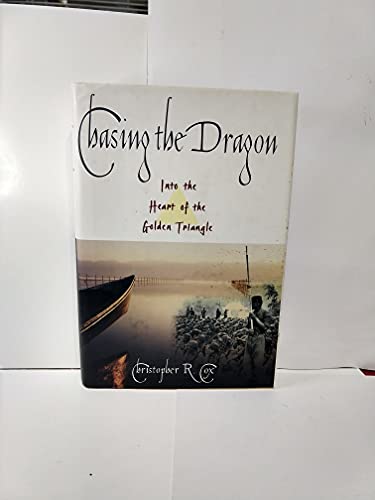Synopsis
A feature reporter relates his adventures and misadventures as he enters Burma in search of an interview with the drug kingpin, Khun Sa, who controls thirty percent of the heroin entering the United States.
Reviews
Perhaps 60% of the heroin in the U.S. originates in the Golden Triangle, where Laos, Thailand and Burma (Myanmar) meet. But when Boston Herald reporter Cox went to Southeast Asia in 1994, his aim was to enter Shan State in eastern Burma, a section run by warlord Khun Sa, depicted by the DEA as the evil demon of the heroin trade. Cox was accompanied by his friend Jay Sullivan, a veteran obsessed with finding American POWs and MIAs in the region and aided by an American wheeler-dealer whom Khun Sa trusted. Cox portrays Burma, a brutal police state, as eager to share in drug profits. Thailand has converted itself into a vast bordello, where the number of HIV and AIDS patients may soon reach two million. Khun Sa, according to Cox, sought to make Shan State an independent nation and to phase out heroin production, but the world would not help. Edgy and told with dark humor, Cox's report is richly informative. Illustrations not seen by PW.
Copyright 1996 Reed Business Information, Inc.
An often chilling account of the heroin trade from a Boston Herald reporter. Having done some stories on heroin addiction in Boston, Cox put together a sort of expedition to trace the drug to its source: the rebel Shan State of Burma, a remote, outlaw kingdom of jungle lowlands, impenetrable mountains, and fierce rivers. Cox connected with a sometime Hollywood actor and soldier of fortune, Barry Flynn, who set up an interview with General Khun Sa, the Shan State warlord who in 1994 controlled 60 percent of the world's heroin manufacture. (In an epilogue, Cox informs us that Khun Sa has since retired, in effect turning over his business to the Burmese government.) Cox travels with difficulty through the Shan State, visiting a poppy field and even trying some raw opium, but his arduous trek to reach Ho Mong, Khun Sa's opium town, is anticlimactic. The general seems neither evil nor wise; he offers up long-winded platitudes, … la Castro, about the hospitals and schools he's built, his own patriotism, and the stupidity of the American Drug Enforcement Agency. Otherwise, Cox has written rather a chaotic book: His portrait of the Bangkok sex trade is entertaining, but this information is available elsewhere; and his adventures with his traveling companion, Jay Sullivan, a man obsessed with the MIA/POW issue, would have been better served in another narrative entirely. Cox appears to admire writers such as Hunter Thompson and Michael Herr, but he lacks their sense of focus. Even so, the Shan State material is dynamite. There's the general's own two-step detox program, for instance: cold turkey in a dark pit, followed by beheading if the treatment doesn't take. Cox is a trifle disorganized, but at his best he takes you where no one else has been. (10 illustrations, not seen; 2 maps) -- Copyright ©1996, Kirkus Associates, LP. All rights reserved.
Khun Sa, a cunning and confounding warlord reigning over a remote region of Burma's borderland with Thailand, was once responsible for one-third of the world's heroin, and Cox, an intrepid reporter for the Boston Herald, was determined to interview him. Because travel in this poppy-covered land "came in two categories: under fire or undercover," Cox enlisted the help of some Americans adept at navigating the political tangles of Southeast Asia, having made a number of contacts in their obsessive and futile efforts to find American POWs. As Cox describes all the dangers and enigmatic negotiations associated with his exhausting journey from the sex markets of Thailand to the surprisingly peaceful kingdom of Khun Sa, he limns a picture of a realm ravaged by opium and heroin addiction and the terrible scourge of AIDS. Cox also manages to include a great deal of Burmese history and many alarming facts about drug trafficking and heroin use in his hard-boiled, jittery, and inevitably sobering narrative. Donna Seaman
The Golden Triangle is the area straddling a corner of Burma, Thailand, and Laos that for years has been a major source of opium-based drugs. In the early 1990s, the warlord Khun Sa reportedly controlled one-third of the world's heroin from his base there. Cox, a Boston newspaper reporter, made several visits to the area to interview this man, finally succeeding after some inconvenience. Along the way he engaged despicable people of several cultures, including mercenaries, POW hunters, drug runners, and corrupt officials. His book, while a fascinating portrait of the illegal drug trade in Asia, has a lot of gratuitous sleaze, such as graphic descriptions of the Bangkok sex scene. Cox himself doesn't rise much above it as he crosses borders illegally, uses porno videos for bribes, and even filches airline blankets. Khun Sa, seen here only in two brief meetings, remains a mystery. This is a rip-roaring book that makes the point that the illegal drug traffic corrupts everyone it comes into contact with, and not just the ultimate users. For public libraries.?Harold M. Otness, Southern Oregon State Coll. Lib., Ashland
Copyright 1996 Reed Business Information, Inc.
"About this title" may belong to another edition of this title.
